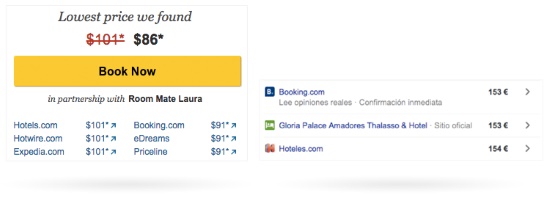
Tripadvisor’s Instant Booking and Book on Google: compare and contrast
By cameron in Uncategorized
This past year, Google and TripAdvisor revolutionised the travel industry by launching Book on Google and Instant Booking respectively. Comparing one with the other will help us understand them both.
NB This is a viewpoint by Pablo Delgado, CEO of Mirai.
Where is the booking made?
Inside TripAdvisor and Google respectively, without leaving their website or app.
What is their objective?
In both cases, improving the user experience by eliminating the loss produced when redirecting to the OTA’s or hotel’s website, thus increasing conversion in these bookings.
Can I “connect” my direct sales? What do I need to “connect”?
Yes, through a partner integrated with TripAdvisor and Google. You need to collaborate with an integrated partner.
Is it a space reserved exclusively for direct sales? Can I stop OTAs from “connecting”?
No. OTAs also have access. To stop them from “connecting” you can negotiate with them directly but it would have to be one by one and would not be a realistic option as of today.
How much does it cost?
Instant Booking: only offers a CPA (commission) model in two formats: 12% or 15%.
Book on Google: is technically free, although to activate it you need to participate in Google Hotel Ads, which has a cost whether it’s in CPC or CPA mode (10% to 50%).
How many entries does the client see in the search results?
On TripAdvisor, as many as there are OTAs bidding on it, although there is only a single “Book Now” button (message that constantly changes as TripAdvisor is always testing). This message usually occupies a prominent position in the results.
Google also shows as many OTAs as are bidding although, unlike Instant Booking, all entries (both OTAs and direct sales) may activate Book on Google.

If I don’t participate with my direct channel, will OTAs do so?
Instant Booking: if you don’t participate, OTAs will and Booking.com is the most aggressive of them all.
Book on Google: it’s irrelevant. OTAs can use it regardless of what you do.
Are they selling their brand or yours?
Instant Booking: the client knows and is aware that he’s booking on TripAdvisor, since the message is prominent.
Book on Google: it’s the channel name which stands out (OTA or official website), so the client ends up booking on Google without knowing.

Once the booking process has started, does the client know he’s booking through the direct channel? Who sends the booking confirmation to the client?
Both state that they are “connected” in the background with the hotel directly, although they do so subtly and always under the TripAdvisor and Google image and logo. The booking confirmation is sent by the channel that’s connected “in the background”. If it’s your direct sale, the client will receive an email like if he’d booked on your website.

Has it become an OTA?
Instant Booking: yes, although with many nuances
Book on Google: no, although with some nuances.
Should I participate?
Instant Booking: if no OTAs are connected, our recommendation is to compare ROI from connecting to Tripconnect compared to that of Instant Booking. However, if Booking.com connects (as it usually does with all hotels), you should participate as a defensive strategy.
Book on Google: it depends on the importance that you give to profitability vs. distancing yourself from the client, with the risk that he becomes loyal to Google and not you. Our recommendation is to give it a try and make a final decision with real data of your hotel.
Conclusion
Book on Google and Instant Booking have as many differences as points in common. However, this isn’t really relevant. The underlying problem in all of this is that the direct sale, much to our disliking, is getting more and more complicated every day.
Therefore, we will have to get used to coexisting with Google and TripAdvisor and learn how to use them intelligently to make more money and reduce OTA dependence.
The challenge will undoubtedly be (and this is what OTAs hang onto) moving sales from OTAs to the direct channel and making it profitable while still paying fees for Google Hotel Ads or Instant Booking. At Mirai we believe that this is possible but we also know that it’s not as simple as connecting your search engine and wait for the bookings to come in. The key, once again, is to have a good strategy and to implement it skilfully.
NB1: This is a viewpoint by Pablo Delgado, CEO of Mirai. It originally appeared on the Mirai blog and is republished here with permission.
NB2: Image by Hadrian/BigStock
![]()

